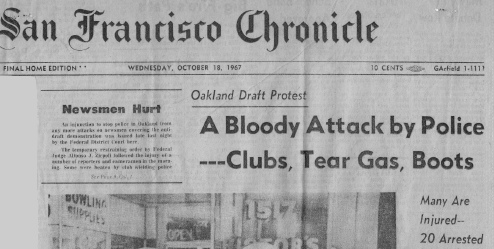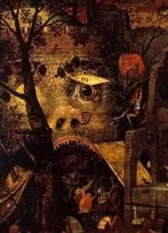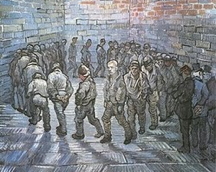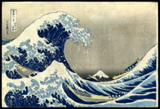Friday 10am
A kid ran across the intersection, sprayed shaving cream, whipped cream, Reddi Whip® on the pavement. Two cops feinted toward him. He fled.
A clutch of people away, a girl screamed but not in fear. Jimmy turned toward her: long blond hair, peasant dress, familiar. She waved at someone across the diagonal of the intersection, but not as in warning or delight or to an unexpected friend. No one waved back. She pushed against the crowd’s inertia, skirting the zone of police. A fat cop issued from his buddies, reached for her, grabbed at her hair, missed, caught her arm at the elbow. His hand slipped to her wrist, held there, yanked her to a stop, heaved her backward. She pulled against him, lashed out with her free hand, boots dug in the pavement. No cops moved to help their fellow officer whose arm, pulled straight, extended against her frantic torque. A tug of war developed, a cartoon: Peasant Tugs Reluctant Burro. Then she slipped, fell to one knee.
Running, Jimmy laced his fingers into a two-handed fist, raised and brought it drop-hammer down on the rigid arm. The cop sucked in a howl, let go the girl’s wrist, stumbled backward from his own released momentum. Jimmy moved to follow her, caught a glance of green eyes as she merged into the crowd, then somewhere at his shoulder black and white flickered and he went blind.
The blow knocked him forward into a roll; the second nightstick missed (he was later told). A message appeared where his eyesight had been, white words on tickertape against the night in his head.
It read:
Sound advice from the Great Beyond, so he did, and somewhere down the block (friendly hands guiding him) the radiant world snapped on with a blurry lag to the right eye (he had been hit at the base of the left parietal) and a dribbly kiss of blood on his neck and ear.
“Hit you OK the doctors,” he heard a monitor say beside him, “end of over here.” His legs warped, hands grabbed a table that jumped in front of him. “Hit by the in back his head,” the monitor explained to a man in a white coat. Medical station. Health Professionals for Peace. Jimmy remembered that.
“Sight?” said the doctor.
“Blacked out. Ok. I’m ok. Kinda.” He blinked the man’s face clear. The doctor yow! probed a soft spot. Someone he knew well but whose name he could not remember stood beside.
“How you doin?”
“Instant hangover,” said Jimmy, then remembered whatfor. “What happened to the girl?”
“She split. Friend of yours?”
“Never saw her before.” Bile lifted in his throat. “You got water?” A medical arm handed him a paper cup; he sloshed water at his mouth.
Gauze tightened around his head. A doctor held forth paper and a ballpoint pen. Medical forms, even here. “I need your name,” he said.
“You don’t know who that is?” a voice marveled behind him, a voice in the crowd, astounded. “That’s Jimmy O’Shea.”
Ooo yeah, thought Jimmy, beatified, whoever you are.
An hour or so earlier
The boy’s shriek — stubbed out by a two-handed baton jab to his gut — harrowed the crowd packed around Jimmy on the sidewalk, wrenched him toward the cry. He set a bootheel on the base of a streetlamp, dug his fingers in the fluting, hoist himself above the heads and screams of the protestors, the noise a ball in his stomach. On the street, five cops beat the boy unprofessionally, dodging each other’s nightsticks, kicking at him blind. The kid, college student, short brown hair, tottered from a whack to the shoulder, tipped over, a small craft under a black squall of cops, and they were at him with boots and batons, nailing him to the street with mechanical dull thuds. A demonstration to the demonstrators: we can do this to you.
If he dies, it’s on me.
“Hey! O’Shea!” A yank at Jimmy’s jacket, thin kid, headband, sweatshirt, never saw him before. “Do something!”
The crowd roiled in pain, churned backward from the intersection. Someone stumbled against Jimmy’s leg, dislodged him from the post. “Do something,” the kid said, “they’re killing him.”
Where was Cosmo? Jimmy thought he saw Hank in the crowd. No, someone like.
“You a fuckin leader?” the kid screamed. In the turmoil it sounded intimate.
“Listen, brother,” said Jimmy.
“Don’t brother me, man.” He turned away, pulled up his sweatshirt. Bruises on his back a roadmap of pain. “Pigs did that on Tuesday. What’re you doing? You’re a leader. Tell us what to do.”
Jimmy’s eyes felt thick, their focus dulled. “Look,” he said. “Look. You got beat up Tuesday cause the fucking pacifists sat down and trapped us. Here.” He pulled a wet handkerchief, protection against tear gas, from his jacket pocket, tore it in half, thrust it at him. “Tie this on your arm. You’re a monitor now. They grabbed that kid cause he stood still. Keep people moving. In the streets but out of reach. C’mon.”
They pushed into an open space. “Keep moving,” Jimmy yelled against the net of fear, “Don’t let them get you. Stay in the street.” The thin kid echoed him, made it a chant: don’t let them get you, stay in the street. Don’t let them get you, stay in the street!”
The cops returned from behind their lines, hunting more meat — but now the demonstrators moved, jittered, slid away from them, waters parting before Pharaoh's army.
Yeah, I’m a fuckin leader I just don’t know what to do.
Life at the mouth of hell
Five days of this and for what? To shut down one building at 13th and Clay, a facility anonymous and disquieting as an unlabled can, built to hold a Center for Sorting Useless Items, or, if Alameda County had one, a Department of Forlorn Hopes and Vacant Time. Instead, it housed the U.S. Armed Forces Induction Center, chokepoint for every Northern California male eligible to be sent to Vietnam.
To the policemen the Induction Center had nothing to do with war. The Center was no different from Sears, Pacific Gas & Electric, or any other institution necessary to civil society. Neither apolitical nor stupid, the Oakland Police believed they were ridding their town of a kind of madness; as if — exactly as if — thousands of Bay Area residents, infected by a rabid hatred of cars or manipulated by anti-internal-combustion extremists, had laid seige to the Department of Motor Vehicles and declared it closed.
Motleyed against them were people who saw the Oakland Induction Center as the nozzle of war, the sucking tube of armed force, having nothing to do with Oakland, California, but the undisguised mouth of Hell. They too wore a kind of uniform, jeans and chinos, zippered jackets from which shirttails bloomed, utilitarian wear found in Army surplus stores, completing a certain ironic clothing cycle. They had been urged to wear boots and motorcycle helmets, to wrap their arms, and the women their chests, in foam rubber to absorb baton blows, not to wear necklaces or earrings that could be ripped or grabbed. Hundreds had gathered before the Center at dawn, by six a thousand milled about the entrance, which looked more closed than ever, its staff sequestered behind opaque windows layered with multicolored spraypaint rants. At seven, one hundred riot police half-stepped out of the four-story municipal parking lot across the street to clear the way for the daily convoy of Army buses trucking draftees and volunteers from as far north as Redding. Above the police, leaning over the rooftop railing, their wives cheered them on. Their wives! Did they carry parasols? Wave lace handkerchiefs? What war did they think this was?
If he dies, it’s on me.
••••
The cops of Monday were moving men. Their crates were the pacifists of Monday who demanded as humans to be treated as objects. As objects they had committed no crime, for they were placed there by others (themselves as humans). The police understood, hauled off their hundred-pound sacks of protest. The Army buses arrived. The Center inducted their contents.
Jimmy, who had once been a pacifist, looked on with contempt.
The cops of Tuesday were neither moving- nor police-men, but pain delivery devices. They had read the manifestos of Stop the Draft Week, PEOPLE GET READY, BY OUR DECREE THE OAKLAND INDUCTION CENTER WILL BE CLOSED, and took them seriously. The protestors of Tuesday, like those of Monday, claimed their right to block the door, but announced they would avoid arrest. This violated natural law. As objects, they intended to commit a crime, and as humans to escape the consequences. You can’t have it both ways, said the cops of Bloody Tuesday, detecting a practical fallacy: as objects you may block the streets, but as humans you will suffer pain. And while we’re at it, no such activity as defending yourself against the police exists for there is no such thing as defense against the law, which we are. Therefore on Tuesday morning the Oakland police charged from the parking structure on Clay like the Legions of the Garrison of Rome, beat, gassed, clubbed, Chemical Maced, and stomped everyone they got their hands on of the thousands who showed up. For this defense against blasphemy they were rewarded with an insulting and incomprehensible banner headline:

profusely illustrated with photos of them hurting people.
And yet, on Tuesday the path to Vietnam was cleared, the buses arrived, the Center inducted their contents.
The cops of Wednesday were bored screws who stood on the corners smoking, chatting, watching picketers circle the block like convicts on an exercise yard, for the leaders of Stop the Draft Week had collapsed in dank despair. At 10 a.m. the buses arrived, the Center inducted their contents.
No one knows what happened the next day, least of all the cops of Thursday. Alameda County Assistant District Attorney Lowell Jensen thought a conspiracy occurred. He was wrong by definition, for the masses cannot conspire. Only leaders can conspire, by concealing their true plans, but the masses knew well their leaders’ true plans, and the masses cannot conspire.
Some believed what happened on Thursday happened on Tuesday. That is, having been punished on Tuesday, the masses decided they might as well commit the crime.
Others believed what happened on Thursday happened on Wednesday — as the slippage of plates on the Pacific floor cannot affect the surface of the sea, which cannot collect its waters into a tsunami, which cannot race a thousand miles and strike the shore until a certain period of time has passed. And yet the moment the plates slip, the fishing village is already doomed, the sleeping families already drowned. Therefore, when the rift slipped on Wednesday, Thursday had already occurred.
All agreed (once it was over) that at some point on Thursday, the sea broke its chains. The leaders of Stop the Draft Week — those later indicted for conspiracy and those not — accomplished their leadership before the Week began, at which point their followers took charge, which must be so. No one controls what they create. If they do it is stillborn.
Owl Light
Now, on a black and white Friday morning as Jimmy ran north on Clay Street, Frye boots ticking on the sidewalk, through the penumbra of war cast across the barrens of downtown Oakland where on normal days one went to pawn, park, drink, sleep it off, buy cheap, go unnoticed, or, if summoned, appear at City Hall to settle a property tax dispute, bribe a bureaucrat, sit on a bench or wait in line — no one knew what was going to happen. Jimmy turned the corner at 17th Street, the sound of packed voices reverberated, he skidded into a barrel of a man, motorcycle helmeted.
“What’s up?” he asked.
Strapped to the man’s left arm was a plywood shield bearing a poster of Che Guevara enjoying a cigar.
“Pacifists,” said the monitor, nodded toward the intersection, “pious fuckin gerbils.”
Jimmy spotted Harris Longforth, owl-glasses reflecting morning light. Traffic flowed freely on San Pablo but eddies of demonstrators blocked cars from turning south toward the Induction Center. At least that, I’ll give you that, but not here, not now. You do not turn this strategic intersection into an altar of redemptive suffering. Not in my demonstration you don't.
He charged through the broken field of demonstrators, onlookers, burst toward Pacifist Central and its guru, Harris Longforth.
“What are you people doing here, Harris?”
A smile leaked from Longworth’s face.
“Demonstrating against the illegal and immoral war in Vietnam. Jimmy.”
“We gave you Monday, you screwed us on Tuesday, you lay your supine bodies down and they beat the shit out of us. Go away. Out.” He shooed them with his arms.
“La lutta continua, Jimmy. You need us.”
Jimmy knew that Harris knew that Jimmy could not relocate a puddle of pacifists against their will away from the probable entry point of the Army buses. Jimmy whirled, thought —
Violent Anti-War Militant
Shreds Owl-like Pacifist
Hurls Globs of Nonviolent Leader
at Police
— leaped to the nearest bus bench, the new kind of concrete and wood, which wobbled. They’re not bolted down. Two blocks away, a line of black uniforms clumped toward them at a steady pace, a cartoon bubble over their white helmets: We whipped your hippie butts on Tuesday here we come again.
“Whatever you do, Harris,” Jimmy jumped from the bench. “Do not sit down in front of the cops, no matter how boundless your desire to suffer. Don’t. Sit. Down.” And in a Peter Sellers fake Indian falsetto, “in the blessed name of the great Mahatma Ghandi.”
The owl smiled with a kindly light. He thought Jimmy needed him. Jimmy thought so too. Neither thought tomorrow’s front page would read:
![]()

 Oakland California, October, 1967
Oakland California, October, 1967



